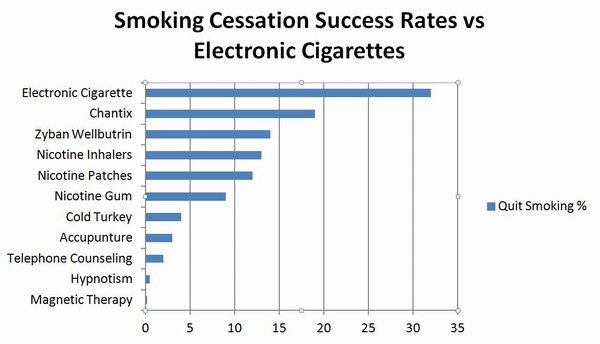Smoking Cessation Devices vs Electronic Cigarettes
1/19/2013

We all know that cigarettes are harmful for many reasons: Obvious health concerns, financial impact, harmful secondhand smoke, and they make everything you own smell like an ashtray are among the top reasons. However, kicking a smoking habit is extremely difficult to do. Just ask any smoker. Most smokers have made numerous attempts over their lifespan to drop the habit. While a few people are successful, the majority fail miserably.
From magnetic therapy to nicotine patches to drug therapy, several companies boast that their smoking cessation products are the best on the market. They spend millions of dollars on advertisements to try to convince you that their products will "cure" your smoking addiction. Many consumers try at least a few of these products with the hope to quit tobacco altogether.
In my desire to educate consumers who would like to quit or find another alternative, I've perused over several smoking cessation studies in order to analyze the data and come to a conclusion on which smoking cessation products are best. In my research, I'll show you which ones are successful and which ones are flops.
So what method has the greatest success rate? Below is the chart where I gathered my information from multiple studies from the United States and abroad to find out the answer to that question.

Although electronic cigarettes (e-cigs) are considered an "alternative to smoking" and are not considered smoking cessation devices according to the FDA, their success rate is approximately 32%. Most of the other two-thirds percentage reportedly cut back on their smoking habit. As e-cigs have been made even better recently using the latest technology, the success rate has climbed even higher. Some studies have even suggested success rates as high as 85%.
I believe the major reason that e-cigs are more effective than smoking cessation devices is the fact that the user still gets the pleasure of "feeling" like they are smoking. The satisfaction of inhaling and exhaling while still getting the desired nicotine provides for the optimal result. Some e-cig users decrease the nicotine level in their e-cigs over time to finally quit, while others continue "smoking" their e-cigs. Several doctors believe that e-cigs are a "better" alternative to smoking traditional tobacco cigarettes. However, many consumers are still waiting for the FDA to provide more testing. Since e-cigs are fairly new to the market, long term test results will likely be a few more years away.
Electronic cigarettes have raised controversy among states like New York who have considered banning them altogether. However since new findings have reported much higher success rates for e-cigs compared to that of smoking cessation devices, several people are taking notice. Many doctors and authors have stated that banning e-cigs would likely harm public health given the success rate for smoking cessation found in the study of e-cigs. Another study has found that there is a growing significant public interest in electronic cigarettes which are by far the most popular smoking alternative.
So there you have it...which method will you choose?










